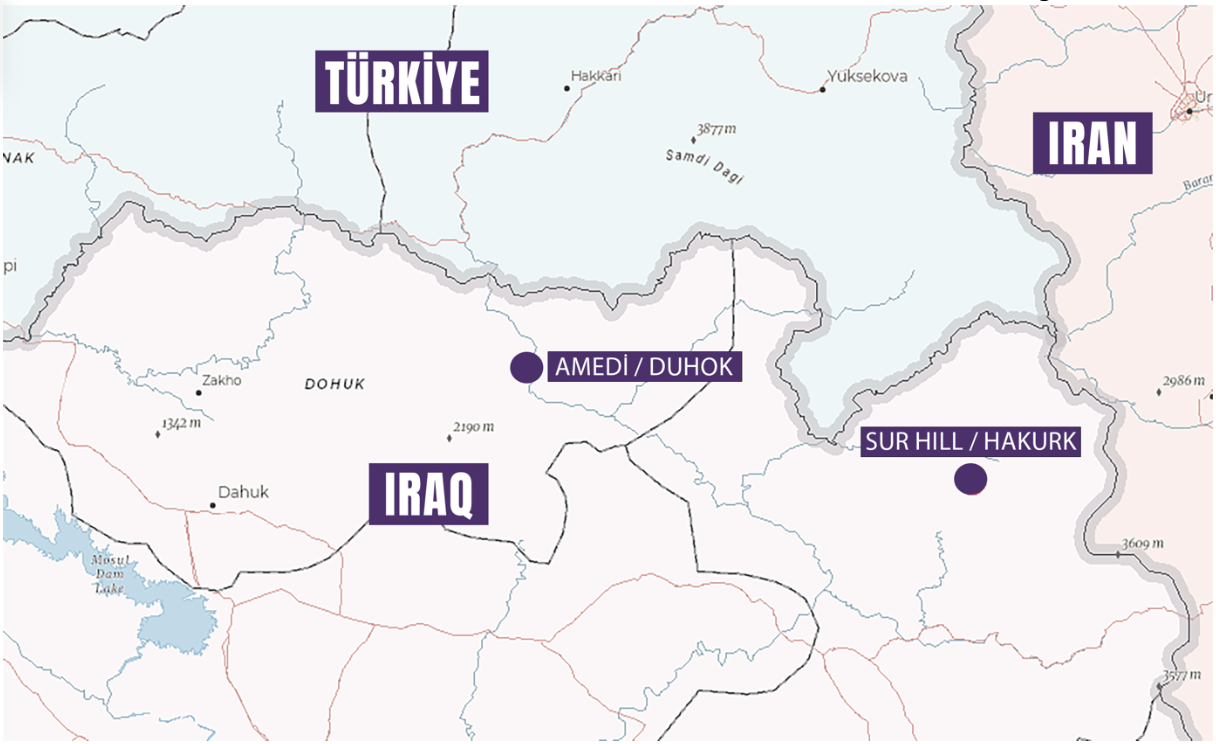How did Turkey lose 12 soldiers to PKK in Iraq?
Twin attacks by the separatist Kurdistan Workers’ Party (PKK) in northern Iraq over the weekend that left 12 Turkish soldiers dead triggered a wave of criticism on Turkish media against the military strategy employed by the Turkish armed forces.
The PKK, with headquarters in northern Iraq’s Qandil mountains, first conducted a surprise attack on Friday on an outpost called Sur Tepe in Harkuk region, which is on the border with Turkey in northeast Iraq, killing six Turkish soldiers.
The next day, the militants infiltrated a Turkish-held position further west, in the Amedi countryside of Duhok, killing an additional six Turkish soldiers. Both outposts, though far from each other, are mountainous areas with harsh winter conditions.
Ankara since 2019 has penetrated deeper into Iraqi territory under Operation Claw Lock, establishing a series of temporary camps to deny PKK movement towards Turkey by using weaponry such as drones and satellites.
The PKK has waged a conflict against the Turkish state since the 1980s, involving violence that has killed tens of thousands of people. Turkey, the US and the EU have designated the PKK as a terror group due to the attacks it has carried out on civilians.
Stay informed with MEE’s newsletters
Sign up to get the latest alerts, insights and analysis,
starting with Turkey Unpacked
A Turkish source with knowledge of the weekend attacks told Middle East Eye that the PKK succeeded in these because of a snow storm and dense fog in both areas, where drones cannot track its movements and surveillance is limited. The source spoke anonymously because he wasn’t authorised to talk to the media.
The source said the army reinforced the Sur Tepe region with two additional commando branches. “Although the battalion commander was injured during the conflict, he did not give up the command and management, thus preventing heavier losses,” the source said.
A second security source told MEE that the second attack, which occurred in the countryside of Duhok was fierce, with the two siddes clashing almost “hand-to-hand” for more than two hours in a very narrow area. The source claimed that 12 PKK militants were killed as a result.
However, the attacks led many to question the viability of placing Turkish soldiers in make-shiff camps covered by snow, especially after footage showing locations was leaked to the media, and where reinforcement and supply is extremely hard due to the distance to the border.
The footage is allegedly showing the harsh conditions of Turkish military outpost in Sur Tepe.
Retired Turkish colonel Orkun Ozeller told a Turkish TV station on Saturday that the current Turkish operation is “wrong both strategically and tactically” due to the distance to the Turkish border areas.
A third source said that the military couldn’t establish permanent bases in Iraqi territory in those regions because the Kurdistan Regional Government, which effectively controls the area, opposed the idea.
“The outposts in these regions are not planned as permanent bases due to the objections and reservations of the interlocutors in Iraq,” the source said. “Frequent rotations of troops are carried out in the region.
“It is more accurate to interpret these areas as continuous points of control. These bases operate as checkpoints [against infiltrations towards the Turkish border] for a certain area in cases where geography and weather conditions pose a risk.”
Unal Atabay, a retired Turkish colonel, said Turkey relies on ad-hoc outposts in the area because it cannot establish permanent bases on sovereign Iraqi state due to international law.
“Temporary bases are operational within their own immediate areas by blocking the travel and transit routes of terrorist elements,” he told MEE.
Harsh weather conditions
A fourth source defended the military’s strategy, saying that the army trained its soldiers for these camps and logistics haven’t been a problem, blaming the harsh weather conditions where PKK could ambush the soldiers.
Abdullah Hawez, an independent Kurdish researcher, said that the Turkish military used to abandon these outposts in the winter, but it appears to have changed its strategy. He added that it was easier for PKK to target Turkish troops because they have lighter weapons, which facilitate their movement.
“They are more accustomed to the weather and geography, having navigated these mountains for years, even in winter,” he told MEE. “It seems that with advances in Turkish weaponry and improved performance against the PKK, the Turkish military has gained enough confidence to continue operations even during winter, but this likely means more casualties for the Turkish military.”
The first source said the military decided to remain in northern Iraq even during the harsh winter conditions because PKK had been reclaiming the territory, planting improvised explosive devices and giving a hard time to Ankara to recapture them during summer for the past 35 years.
“These summer operations also caused serious costs in terms of human resources, material and political costs,” the source said. “The Claw Operations series is aimed at pushing the terrorist organization abroad with a continuous chain of operations across a large region.”
The Turkish army after the attack launched a retaliatory air campaign against both the PKK and Syrian Democratic Forces (SDF) in Syria, specfically targeting infrastructure, such as oil facilities and electricity stations in northeastern Syria. Turkey views SDF as a sister organisation of the PKK.
Hawez calls Turkey’s operations both in Syria and Iraq “temporary solutions”, adding that the issue could never be fully resolved through military means.
“Having a military upper hand might be beneficial in the short term, but I believe that, unless it is complemented by and used to advance a political solution, the threat of the PKK, which is part of the wider Kurdish question, will persist,” he said.
“Despite the prevailing opinion and environment, I believe both the political groups close to the PKK and the Turkish government have matured enough to understand this fact.”
Additional reporting by Cagatay Cebe in Istanbul and Ragip Soylu in Ankara.


